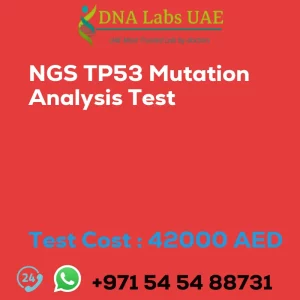Targeted Mutation Analysis 2 Mutations Test
At DNA Labs UAE, we offer the targeted mutation analysis 2 mutations test for individuals who need to identify specific mutations in a gene or DNA sequence of interest. This test can provide valuable information for diagnosis and treatment planning. Here are the details:
Test Name: Targeted Mutation Analysis 2 Mutations Test
Test Components:
- EDTA Vacutainer (2ml) / Sterile Container
Price: 3000.0 AED
Sample Condition:
- Peripheral blood
- Plasma
- Serum
- Amniotic fluid
- Cord blood
- Chorionic villi
Report Delivery: 10-15 days
Method: Sanger Sequencing
Test Type: Genetics
Doctor: Gynecologist
Test Department:
Pre Test Information:
Targeted mutation analysis (2 mutations) can be done with a doctor’s prescription. Please note that prescription is not applicable for surgery and pregnancy cases or people planning to travel abroad.
Test Details:
Targeted mutation analysis refers to the process of identifying specific mutations in a gene or DNA sequence of interest. In this case, there are two mutations that need to be analyzed.
The first step in targeted mutation analysis is to design specific primers that will amplify the region of interest containing the mutations. These primers are designed to specifically bind to the DNA sequence flanking the mutation sites. The primers are then used in a polymerase chain reaction (PCR) to amplify the target DNA.
After amplification, the PCR products are subjected to various methods of mutation detection. One common method is DNA sequencing, where the amplified DNA is sequenced to identify any changes in the nucleotide sequence. This can be done using Sanger sequencing or more advanced methods like next-generation sequencing.
Another method for targeted mutation analysis is the use of allele-specific PCR or restriction fragment length polymorphism (RFLP) analysis. These methods rely on the presence or absence of specific restriction enzyme recognition sites that are affected by the mutations. By digesting the amplified DNA with the appropriate restriction enzyme, the presence or absence of the mutations can be determined.
Other techniques such as denaturing high-performance liquid chromatography (DHPLC), single-strand conformational polymorphism (SSCP) analysis, and allele-specific hybridization can also be used for targeted mutation analysis.
Once the mutations have been identified, their functional significance can be assessed by comparing them to known databases or conducting functional studies in cell lines or animal models. This can help determine the potential impact of the mutations on gene function and disease development.
Overall, targeted mutation analysis involves the design of specific primers, amplification of the target DNA, and the use of various methods to identify and characterize the mutations of interest.
| Test Name | Targeted mutation Analysis 2 mutations Test |
|---|---|
| Components | EDTA Vacutainer (2ml)/ Sterile Container |
| Price | 3000.0 AED |
| Sample Condition | Peripheral blood\/ Plasma\/ Serum\/ Amniotic fluid \/ Cord Blood\/Chorionic villi |
| Report Delivery | 10-15 days |
| Method | Sanger Sequencing |
| Test type | Genetics |
| Doctor | Gynecologist |
| Test Department: | |
| Pre Test Information | Targeted mutation Analysis (2 mutations) can be done with a Doctors prescription. Prescription is not applicable for surgery and pregnancy cases or people planing to travel abroad. |
| Test Details |
Targeted mutation analysis refers to the process of identifying specific mutations in a gene or DNA sequence of interest. In this case, there are two mutations that need to be analyzed. The first step in targeted mutation analysis is to design specific primers that will amplify the region of interest containing the mutations. These primers are designed to specifically bind to the DNA sequence flanking the mutation sites. The primers are then used in a polymerase chain reaction (PCR) to amplify the target DNA. After amplification, the PCR products are subjected to various methods of mutation detection. One common method is DNA sequencing, where the amplified DNA is sequenced to identify any changes in the nucleotide sequence. This can be done using Sanger sequencing or more advanced methods like next-generation sequencing. Another method for targeted mutation analysis is the use of allele-specific PCR or restriction fragment length polymorphism (RFLP) analysis. These methods rely on the presence or absence of specific restriction enzyme recognition sites that are affected by the mutations. By digesting the amplified DNA with the appropriate restriction enzyme, the presence or absence of the mutations can be determined. Other techniques such as denaturing high-performance liquid chromatography (DHPLC), single-strand conformational polymorphism (SSCP) analysis, and allele-specific hybridization can also be used for targeted mutation analysis. Once the mutations have been identified, their functional significance can be assessed by comparing them to known databases or conducting functional studies in cell lines or animal models. This can help determine the potential impact of the mutations on gene function and disease development. Overall, targeted mutation analysis involves the design of specific primers, amplification of the target DNA, and the use of various methods to identify and characterize the mutations of interest. |








